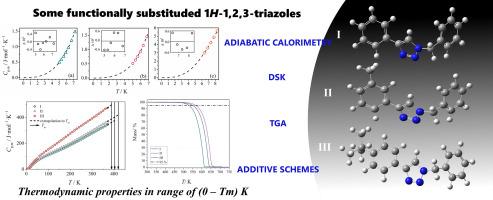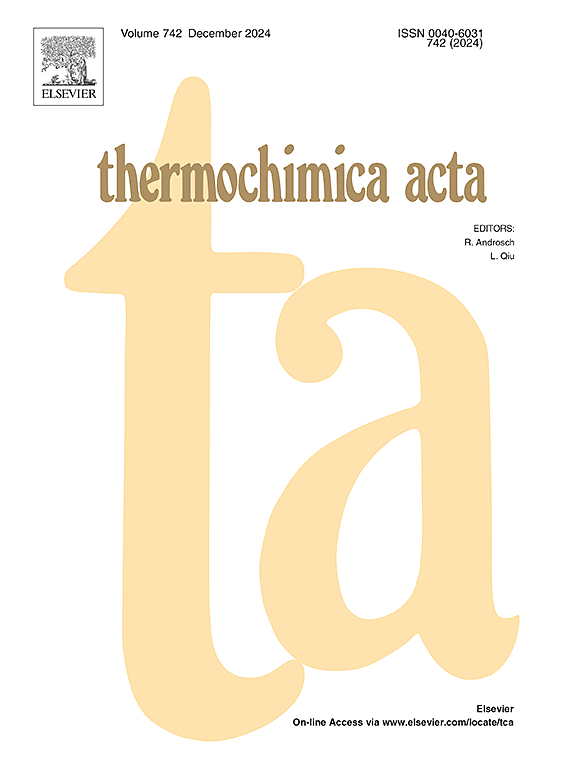Heat capacities and thermodynamic functions of three 1-benzyl-4-aryl-1H-1,2,3-triazoles in the temperature range of (0 – Tm) K
IF 3.1
2区 化学
Q2 CHEMISTRY, ANALYTICAL
引用次数: 0
Abstract
In this paper, we present the results of comprehensive thermodynamic study of some functionally substituted triazoles such as 1-benzyl-4-phenyl-1H-1,2,3-triazole, 1-benzyl-4-(m-tolyl)-1H-1,2,3-triazole and 1-benzyl-4-(4‑tert-butylphenyl)-1H-1,2,3-triazole. The temperature dependences of heat capacities of 1-benzyl-4-(m-tolyl)-1H-1,2,3-triazole and 1-benzyl-4-(4‑tert-butylphenyl)-1H-1,2,3-triazole were measured in a wide temperature range of ∼(5 – 370) K using the adiabatic calorimetry. Those of 1-benzyl-4-phenyl-1H-1,2,3-triazole were determined at the range of ∼(5 – 80) K, supplementing the previous measurements at the more elevated temperatures. The melting parameters and thermal stability (melting temperature, enthalpy of fusion, temperature of thermal destruction) of the compounds were determined using the differential scanning calorimetry. Also, the standard thermodynamic functions (absolute entropies, reduced enthalpies and Gibbs energies) were calculated in the temperature range of (0 – Tm) K.

三种 1-苄基-4-芳基-1H-1,2,3-三唑在 (0 - Tm) K 温度范围内的热容量和热力学函数
本文介绍了一些功能取代的三唑,如 1-苄基-4-苯基-1H-1,2,3-三唑、1-苄基-4-(间甲苯基)-1H-1,2,3-三唑和 1-苄基-4-(4-叔丁基苯基)-1H-1,2,3-三唑的综合热力学研究结果。采用绝热量热法测量了 1-苄基-4-(间甲苯基)-1H-1,2,3-三唑和 1-苄基-4-(4-叔丁基苯基)-1H-1,2,3-三唑在 ∼(5 - 370) K 宽温度范围内的热容量随温度变化的关系。在 ∼(5 - 80) K 范围内测定了 1-苄基-4-苯基-1H-1,2,3-三唑的热稳定性,补充了之前在较高温度下的测量结果。利用差示扫描量热法测定了化合物的熔化参数和热稳定性(熔化温度、熔焓、热破坏温度)。此外,还计算了 (0 - Tm) K 温度范围内的标准热力学函数(绝对熵、还原焓和吉布斯能)。
本文章由计算机程序翻译,如有差异,请以英文原文为准。
求助全文
约1分钟内获得全文
求助全文
来源期刊

Thermochimica Acta
化学-分析化学
CiteScore
6.50
自引率
8.60%
发文量
210
审稿时长
40 days
期刊介绍:
Thermochimica Acta publishes original research contributions covering all aspects of thermoanalytical and calorimetric methods and their application to experimental chemistry, physics, biology and engineering. The journal aims to span the whole range from fundamental research to practical application.
The journal focuses on the research that advances physical and analytical science of thermal phenomena. Therefore, the manuscripts are expected to provide important insights into the thermal phenomena studied or to propose significant improvements of analytical or computational techniques employed in thermal studies. Manuscripts that report the results of routine thermal measurements are not suitable for publication in Thermochimica Acta.
The journal particularly welcomes papers from newly emerging areas as well as from the traditional strength areas:
- New and improved instrumentation and methods
- Thermal properties and behavior of materials
- Kinetics of thermally stimulated processes
 求助内容:
求助内容: 应助结果提醒方式:
应助结果提醒方式:


